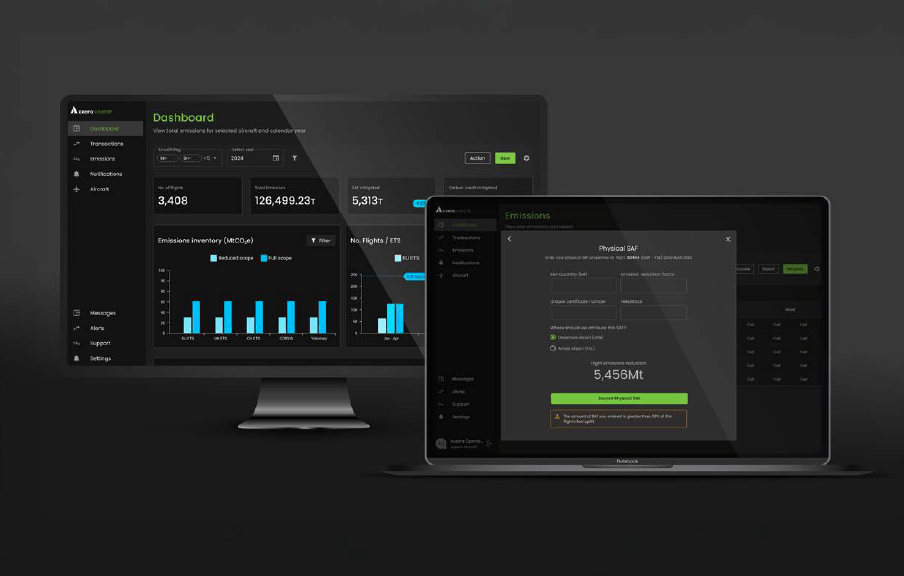By Puja Mahajan, CEO & Founder, Azzera – © Azzera
“Aviation has always been synonymous with innovation, connecting people and cultures across the globe. Today, however, the industry faces an unprecedented challenge: balancing its role as a driver of global connectivity with the need to drastically reduce its environmental impact. After over 30 years working in aviation, I’ve witnessed firsthand how sustainability is reshaping aviation, particularly in luxury private aviation—a sector often scrutinized for its carbon footprint. This commentary explores the progress made, the road ahead, and how Azzera is empowering operators to embrace a greener future.
The State of Sustainable Aviation
The aviation industry contributes approximately 2% of global CO2 emissions, with private aviation accounting for a smaller fraction— about 0.04%. Despite this relatively modest share, private aviation’s environmental impact is increasingly under the microscope due to its high per-passenger emissions. Between 2019 and 2023, emissions from private jets rose by 46%, driven by post-COVID recovery and growing demand in emerging markets. This underscores the urgency for sustainable solutions.
The reality is that business aviation has a remarkable history of innovation in fuel efficiency. Over the past 40 years, fuel efficiencies have improved by 40% (NBAA). These advancements reflect the industry’s commitment to reducing its environmental footprint without compromising performance or luxury.
Sustainable aviation fuel (SAF) has emerged as a cornerstone of decarbonization efforts. It can reduce lifecycle greenhouse gas emissions by up to 85% compared to conventional jet fuels (depending on the feedstock used). Driven mainly by the recent ReFuelEU compliance requirements, European operators are investing heavily in SAF to power flights, athough challenges remain regarding feedstock availability and lifecycle analysis, leading to debates about long-term supply. Despite these concerns, SAF remains the most viable solution for immediate emission reductions without requiring fleet overhauls or extensive infrastructure changes.
When SAF availability is limited for uplift at certain locations, the «Book-and-Claim» system offers an innovative solution to scale production by providing a demand signal to producers while enabling immediate emission reductions. Business aviation is uniquely positioned as a key market for this approach, given its clientele’s willingness to support innovation.
Looking further ahead, electric aircraft and hybrid propulsion systems are gaining traction, yet entry into service is not immediate. Innovations like Bye Aerospace’s eFlyer 800 and Luxaviation’s partnership with Lilium for eVTOLs demonstrate promising advancements in regional and short-haul travel. While long-haul electric aviation remains a distant goal due to technological limitations, these developments signify a significant willingness to shift toward fossil fuel independence.
Operational efficiencies also play a pivotal role in reducing emissions today. AI-driven maintenance systems in jets like Bombardier’s Global 7500 optimize fuel use, while eco-friendly interiors crafted from natural fibers balance luxury with sustainability. These measures not only reduce environmental impact but also enhance cost-effectiveness—a crucial consideration as carbon compliance costs rise.

Azzera’s Contribution: Simplifying Sustainability
When I founded Azzera in 2021, my vision was clear: make sustainability accessible and actionable for the aviation ecosystem. Many industry players were eager to reduce their carbon footprint but struggled with regulatory complexities like the EU Emissions Trading System (EU ETS) and ICAO’s Carbon Offsetting and Reduction Scheme for International Aviation (CORSIA). This inspired CELESTE, a cloud-native platform designed to streamline emissions management and compliance while mitigating the risks of non-compliance.
CELESTE integrates seamlessly with flight scheduling software to calculate emissions in real time, categorizing them into the appropriate compliance markets. By automating processes, it significantly reduces workload and the financial risk of noncompliance, allowing operators to focus on delivering exceptional service. For charter companies, CELESTE’s Fly Beyond feature offers clients an effortless way to incorporate SAF, as well as invest in highquality carbon credits through an automated quote system, ensuring transparency without compromising luxury standards.
Azzera’s patented Impact Score system elevates carbon credit selection by evaluating projects on technical and financial criteria. This ensures operators can purchase high-quality credits with the best price-to-quality ratio while avoiding greenwashing risks. CELESTE also supports SAF adoption with tools like Book-and-Claim systems and usage monitoring, helping operators meet ReFuelEU mandates and advance toward net-zero goals.
The Road Ahead
Sustainable aviation is not merely about meeting regulatory requirements; it’s about transforming the industry into a model of environmental stewardship. According to a recent Jetcraft study, the share of buyers under 45 has nearly doubled in the last decade to a record 29% in 2024. These owners are increasingly demanding carbon-neutral options. Another study from 2023 showed that 85% of travelers were willing to pay a premium for sustainable flight. The drive towards sustainability in aviation does not only come from external factors. The industry is attracting new talent, paving the way towards change. European initiatives like Clean Sky 2 and Horizon 2020 have been funding research into cleaner technologies, while companies like Airbus and Rolls Royce offer internships focused on sustainability. Universities such as Delft University of Technology are preparing students for careers in green aerospace engineering, reflecting a generational shift toward eco-conscious innovation
A Personal Perspective
For me, this journey comes full circle—from an aerospace engineer captivated by flight’s ability to connect people worldwide to leading a company that enables aviation’s journey to net zero. At Azzera, we aim not just to help operators comply with regulations but to inspire them to embrace sustainability as an integral part of their operations. Our skies are more than just pathways; they’re bridges between cultures and communities. By making sustainability simpler through technology like CELESTE, we hope to preserve this privilege for generations while safeguarding our planet’s future. The hurdles may be daunting, but they’re also stepping stones toward a cleaner, more inclusive future for aviation. In luxury private aviation—and indeed across the sector—the green revolution is underway. The question is no longer whether we can afford sustainability but whether we can afford not to embrace it.”









